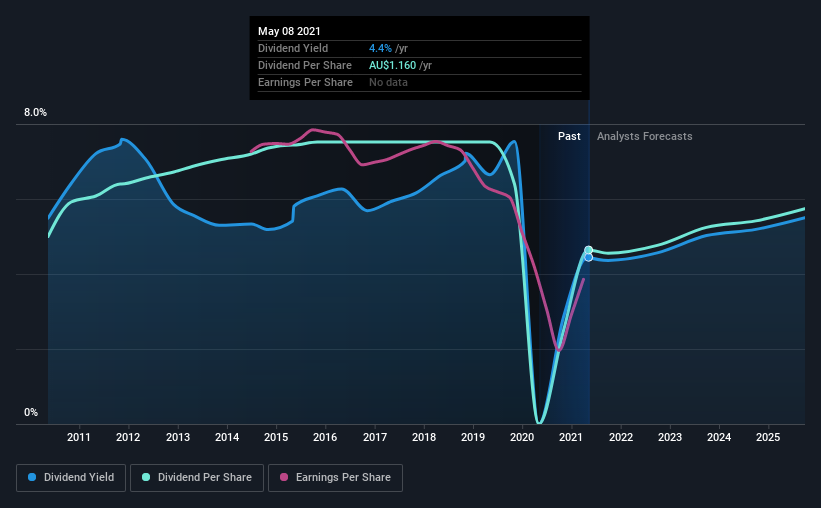It Might Not Be A Great Idea To Buy Westpac Banking Corporation (ASX:WBC) For Its Next Dividend
Westpac Banking Corporation (ASX:WBC) stock is about to trade ex-dividend in 4 days. You will need to purchase shares before the 13th of May to receive the dividend, which will be paid on the 25th of June.
Westpac Banking's upcoming dividend is AU$0.58 a share, following on from the last 12 months, when the company distributed a total of AU$1.16 per share to shareholders. Last year's total dividend payments show that Westpac Banking has a trailing yield of 4.4% on the current share price of A$26.09. Dividends are a major contributor to investment returns for long term holders, but only if the dividend continues to be paid. As a result, readers should always check whether Westpac Banking has been able to grow its dividends, or if the dividend might be cut.
See our latest analysis for Westpac Banking
If a company pays out more in dividends than it earned, then the dividend might become unsustainable - hardly an ideal situation. Westpac Banking paid out 71% of its earnings to investors last year, a normal payout level for most businesses.
When a company paid out less in dividends than it earned in profit, this generally suggests its dividend is affordable. The lower the % of its profit that it pays out, the greater the margin of safety for the dividend if the business enters a downturn.
Click here to see the company's payout ratio, plus analyst estimates of its future dividends.
Have Earnings And Dividends Been Growing?
Businesses with shrinking earnings are tricky from a dividend perspective. If earnings fall far enough, the company could be forced to cut its dividend. Westpac Banking's earnings per share have fallen at approximately 13% a year over the previous five years. Ultimately, when earnings per share decline, the size of the pie from which dividends can be paid, shrinks.
Many investors will assess a company's dividend performance by evaluating how much the dividend payments have changed over time. Westpac Banking's dividend payments per share have declined at 0.7% per year on average over the past 10 years, which is uninspiring.
The Bottom Line
Is Westpac Banking worth buying for its dividend? We're not overly enthused to see Westpac Banking's earnings in retreat at the same time as the company is paying out more than half of its earnings as dividends to shareholders. These characteristics don't generally lead to outstanding dividend performance, and investors may not be happy with the results of owning this stock for its dividend.
With that being said, if you're still considering Westpac Banking as an investment, you'll find it beneficial to know what risks this stock is facing. In terms of investment risks, we've identified 1 warning sign with Westpac Banking and understanding them should be part of your investment process.
We wouldn't recommend just buying the first dividend stock you see, though. Here's a list of interesting dividend stocks with a greater than 2% yield and an upcoming dividend.
This article by Simply Wall St is general in nature. It does not constitute a recommendation to buy or sell any stock, and does not take account of your objectives, or your financial situation. We aim to bring you long-term focused analysis driven by fundamental data. Note that our analysis may not factor in the latest price-sensitive company announcements or qualitative material. Simply Wall St has no position in any stocks mentioned.
Have feedback on this article? Concerned about the content? Get in touch with us directly. Alternatively, email editorial-team (at) simplywallst.com.

 Yahoo Finance
Yahoo Finance 
